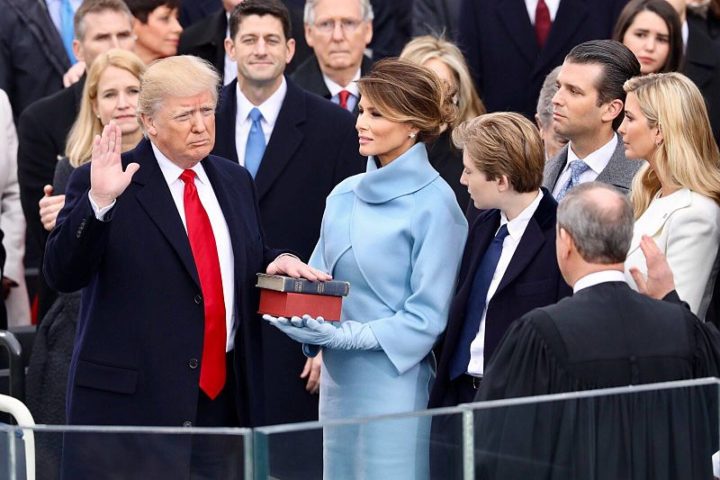来月6日の中間選挙を目前にして、ビリー・グラハム・センター研究所が、2016年大統領選についての最も悪名高い統計を調査した。
[toggle]Ahead of the midterms, the Billy Graham Center Institute examined the most infamous statistic about faith and the 2016 election. [/toggle]「福音派の白人有権者の81パーセントが2016年大統領選でドナルド・トランプ氏に投票した」という事実ほど、この2年以上にわたり、福音派の内外で議論を巻き起こした統計はなかった。見方によっては、結束か、一つの妥協のしるしだ。数字は、事実かフィクションかがはっきりしない点についての意見と解説に影響を与える。
[toggle]Over the past two years, few statistics have sparked as much debate both inside and outside evangelicalism as the fact that 81 percent of white evangelical voters picked Donald Trump in the 2016 election. Depending on your views, it’s either a sign of solidarity or one of compromise—a number wrought with opinions and commentary to the point where fact and fiction are blurred. [/toggle]
2017年1月、大統領就任の誓約をするドナルド・トランプ氏(写真:White House photographer)
「トランプ氏に投票した福音派の全有権者がトランプ主義のすべてに賛成している」という意見を示すため、メディアや研究機関によってこの統計はしばしば用いられてきた。福音派クリスチャンも、そうでない者も、米国史上最も分裂し、驚かせた選挙を理解しようとするとき、「81パーセント」は多くの人にとって訴えかける物語となった。これは、「福音派があまりにも政治化し、過小評価され、またその最も好戦的な要素に乗っ取られた」という批判に合致する。
[toggle]The statistic has often been used in the media and in academia to represent the idea that all evangelical Trump voters were “all in” for everything that encompasses Trumpism. As Americans (both evangelical and non-evangelical) tried to understand one of the most polarizing and surprising elections in our country’s history, the 81 percent became the go-to narrative for many. It fit longstanding criticisms that evangelicalism had become over-politicized, under-discipled, and hijacked by some of its most belligerent elements. [/toggle]2018年の中間選挙の準備期間、ホイートン大学のビリー・グラハム・センター研究所はライフウェイ・リサーチ社と共同で、81パーセントの福音派クリスチャンの政治姿勢のより良い理解について調査した。そこでは、3000人の米国人を次の3つのカテゴリーに分けて調べた。福音派としてのアイデンティティーを持つ者、福音派の信仰を持つ者、福音派の自覚なり核となる福音的で神学的な価値観を持たない者(「ただイエス・キリストによってのみ救われる」といった信仰も含めて)だ。
[toggle]In the run-up to the 2018 midterm elections, the Billy Graham Center Institute at Wheaton College worked with LifeWay Research to better understand the 81 percent and evangelicals’ political engagement. We polled 3,000 Americans in three categories: those who self-identify as evangelicals, those with evangelical beliefs, and those who neither see themselves as evangelicals nor hold certain core evangelical theological views (such as a belief in salvation through Jesus Christ alone). [/toggle]ほかの洞察の中でも、このデータは、「81パーセント」統計の注目に値する6つの鍵となる事実を明らかにしている(研究所と「クリスチャニティー・トゥデイ」は今後さらなる分析を特集する予定)。
[toggle]Among other insights, the data reveal six key facts about the 81 percent statistic that are worth highlighting. [The institute and CT will feature more analysis in the coming weeks.] [/toggle]私たちは「81パーセント」か?
[toggle]Are We the 81 Percent? [/toggle]出口調査によれば、白人の福音派クリスチャンであると自覚のある10人中8人は、2016年大統領選でドナルド・トランプ氏に投票した。しかし、米国の福音派の3分の1は白人ではなく、またアイデンティティーは信仰と異なるばかりか、すべての福音派クリスチャンが投票したわけでもない。ホイートン大学ビリー・グラハム・センターは、1000人以上の白人・非白人福音派クリスチャンに調査を行い、より深い実情を明らかにした。
[toggle]Exit polls indicate 8 out of 10 self-identified white evangelicals who voted in the 2016 presidential election voted for Donald Trump. But given that 1 in 3 evangelicals in America today is non-white, identity is different than belief, and not every evangelical voted, the Billy Graham Center at Wheaton College took a deeper look by surveying more than 1,000 white and non-white evangelical believers. [/toggle]特に明記しない限り、本調査における「福音派」とは、米国福音同盟の調査実施要綱による福音派信仰に分類される多民族で構成された回答者集団を指す。
[toggle]Unless specified otherwise, references to evangelicals in this study include only a multiethnic group of respondents classified as evangelical by belief according to the National Association of Evangelicals research protocol. See below for methodology. [/toggle]
「81パーセント」は、投票動機の識別を間違えている
[toggle]The 81 percent fails to differentiate the motivations behind voting. [/toggle]どの選挙においても、人々はその判断において、熱狂と確信のさまざまなレベルで投票することができる。近年最も分裂した選挙で投票者は、好ましい候補者に対して熱狂的であるよりは妥協的だった。たとえばピュー研究所によれば、2016年6月の時点で白人福音派クリスチャンの78パーセントがトランプ氏に投票するつもりだったことを明らかにしているが、45パーセントはおもにヒラリー・クリントン氏に投票し、トランプ氏に投票したのは30パーセントしかいなかった。
[toggle]In every election, people can vote with varying levels of enthusiasm and confidence in their decision. In an election that was one of the most polarizing in recent history, voters were often more reluctant than enthusiastic about their preferred candidate. For example, the Pew Research Center found in June 2016 that while 78 percent of self-identified white evangelical voters planned to vote for Trump, 45 percent were mainly voting against Hillary Clinton and only 30 percent were voting for Trump himself. [/toggle]我々の調査では、このように質問した。「以下のうち、あなたの投票の考え方に最も近いのはどれですか」。福音派信仰を持つクリスチャンの半数のみが、「特定の候補者に投票する」とした。クリントン氏、トランプ氏、第三の投票の間で、福音派は別の理由により特定の候補者に投票しただけのようだった。したがって問題とするなら(そして、福音派クリスチャンの3分の1が、「クリントン、トランプ、あるいはその両方に反対している」と言ったのだが)、何が、そしてなぜ重要だったかということに注目すべきだ。
[toggle]In our survey, we asked, “Which of the following best characterizes how you thought about your vote?” Only half of evangelicals by belief characterized their vote as “voting for their specific candidate.” Across Clinton, Trump, and third-party voters, evangelicals were just as likely to be voting in favor of a specific candidate as for another reason. So, while the who did matter (and 1 in 3 evangelicals said their vote was against Clinton, Trump, or both), the what and the why mattered also. [/toggle]実際、多くの有権者は、特定の問題や政策、または政党に投票するため、候補者の人間性は無視することを選び、自分の価値観や理念に合う個人ではなく、党を代表する人物として見たのだ。福音派クリスチャンの多く(59%)は、個々の政治指導者ではなく、特定の問題に賛成したり批判したりすることに政治的支持を与えることにした。
[toggle]In fact, many voters chose to look past a candidate as an individual to vote for a specific issue, platform, or party that they represent, seeing the candidates more like objects of representation than as individuals whose values and ideals fit theirs. A majority of evangelicals by belief (59%) agreed that their political support should be tied more to praising or criticizing specific issues rather than individual political leaders. [/toggle]つまり、トランプ氏を支持した福音派の多くの有権者は、候補者としてのトランプ氏には熱狂的ではなかったのだ。(次ページに続く)
[toggle]Put another way, many of Trump’s evangelical voters were not enthusiastic about him as a candidate. [/toggle]
